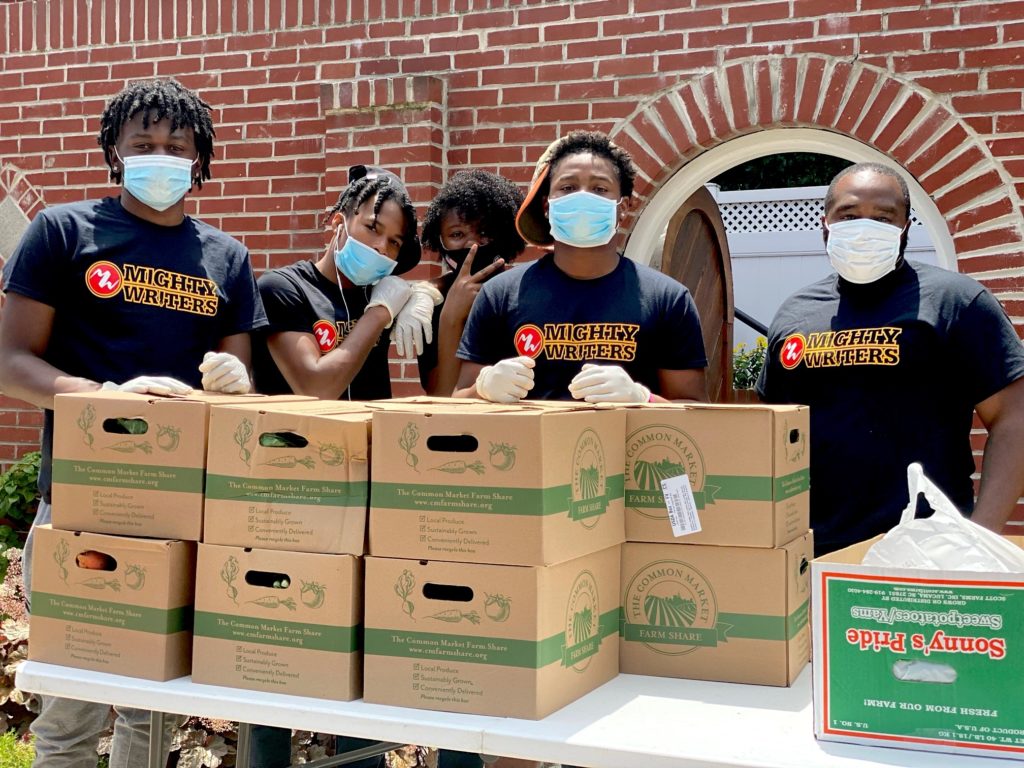The Mighty Writers trajectory: How to start small, scale up with success, and pivot in crisis
 March 3, 2021
Category: Featured, Long, Method
March 3, 2021
Category: Featured, Long, Method
Mighty Writers went from a modest literacy program at a single site, to an organization with multiple sites across the city and, during the COVID pandemic, has redeployed staff and repurposed some of its sites to become food hubs to meet the needs of the neighborhoods involved.
Generocity spoke with Tim Whitaker, Mighty Writers‘ executive director, to understand the method other nonprofits might be interested in looking at.
Whitaker said that the organization was quickly successful at its Christian Street location when it started in 2010. He thought: if it is working in this community, why can’t it work in other communities as well?
In the nonprofit’s third year, it expanded to West Philly.
“We went to West Philly and we had a lot of success there,” Whitaker said. “We just kept replicating the program in different locations — with a Mexican community in the 9th Street Market, in Camden, in North Philly, and then with a farm working community out in Kennett Square.”
“We just kept growing and the funding followed.,” he added. “There was no reason to not keep reaching out.”
Mighty Writers has five physical locations, and a number of places where staff go to do programming or food distribution, mostly at PHA centers in West Philly and East Falls, which are not fully fledged Mighty Writers locations.
The food distribution was a result of the COVID pandemic. Mighty Writers closed all their locations in March, like other nonprofits did.
“We saw pretty quickly that particularly in the Mexican community, in the 9th Street market where a lot of the parents worked in restaurants and the kitchens of restaurants, those restaurants were closed immediately,” Whitaker said. “Because a lot of the families had documentation issues, they weren’t going to get relief from the government. So, they were in challenging positions immediately.”
Mighty Writers staff started by giving out lunches to the kids at the 9th Street location, and then saw that the effort wasn’t enough.
“We had to give out groceries, and groceries grew into diapers and masks and wipes and books, and then we saw the other location needed all that help as well,” Whitaker said.

Mighty Writers focuses its regular food distribution at its sites in West Philadelphia, North Philadelphia, and the 9th Street Market. The organization also distributes food to families, when it can, in Camden, and at a location near Kennett Square in Chester County. (Courtesy photo)
In seeing the communities’ needs and trying to meet them, the organization changed the way it deployed its staff of 23 — half of them fulltime employees, and the rest part-time. The in-person writing and literacy classes became virtual, and staff members asked those who worked with the children on their writing to show up and distribute food at the locations.
“A major pivot, to put it mildly,” Whitaker said, adding it was a lot of change in a hurry.
Whitaker isn’t sure when the sites that were shut down will reopen, or what the organization will be like when they do.
“We talk about it, and talk about what it might look like,” he told Generocity, “and everybody’s got an opinion of course about when that might be or what it might look like. My thinking is that it’s going to be an evolution; it’s going to be slow in happening and it could move two steps forward, one step back.”
“We need really good virtual classes for these kids. And right now, these families are suffering. They need food and the moms need diapers, so let’s get it to them,” Whitaker said. “And that to me seems so much more productive than sitting in meetings, trying to guess what it’s going to look like in September.”
Whitaker said the organization’s been really successful in dealing with “pretty much what’s right in front of us. Not trying to anticipate what the future’s going to be exactly.”
What advice would he offer to other nonprofits that are starting out? Look at the community you serve and think how you can serve them best given the circumstances, he said. Throw out whatever it used to be, for now, and don’t worry about getting back to that right now.
“Just deal with what is right in front of you, because we’re living in a very challenging time for a lot of people, and for communities that were challenged before all this happened the problem has doubled,” he said. “My advice is deal with what’s in front of you.”
In terms of scaling, Mighty Writers increased the number of its staff and has not had to lay anyone off. Whitaker thinks it is because what the organization is doing has a dramatic impact on the communities served.
“I think our funders see that, so they responded because we’re not sitting around crying about laying people off and when is it going to get back to normal and all of that,” he said. “We’re acting in this situation.”
Mighty Writers relies on its funders — about 60% are foundations, and almost all the rest are individuals. The organization gets very little corporate support. Since pivoting during COVID, funding has increased.
“It definitely has. I’ve been really pleased with the way foundations have been reacting to dealing with COVID. They’re much quicker, they pivot faster,” Whitaker said. “They’re able to see where the need is in the nonprofit, in my experience.”
“They are funding the nonprofits that are on the move and serving their communities directly.”
Project
COVID as accelerant: New ways of delivering programs & deploying employeesTrending News










